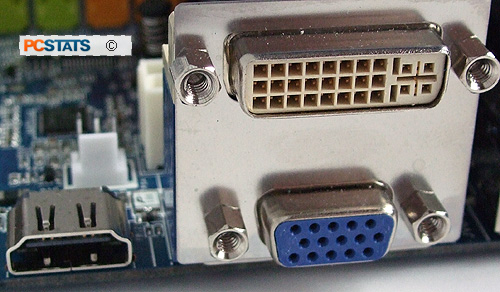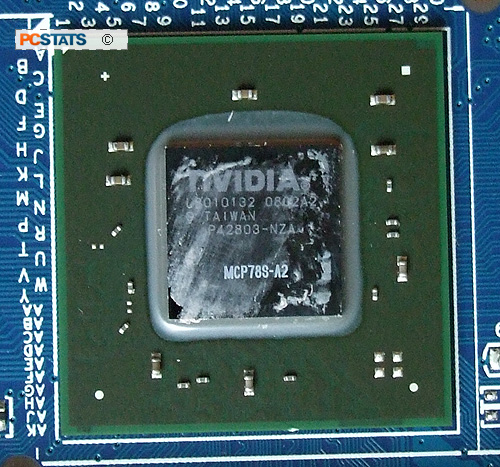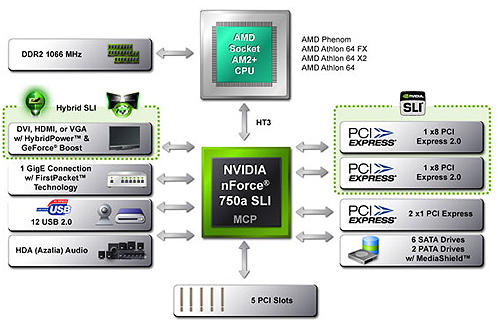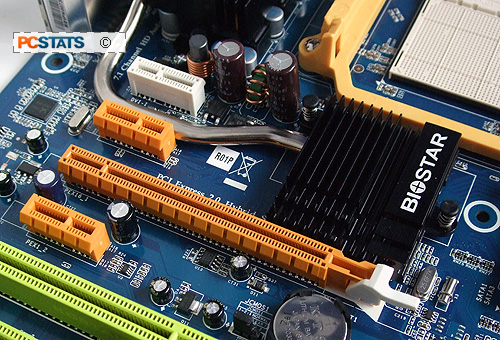As integrated graphics processors
(IGP) have matured they've also started gaining features and capabilities that were
once the sole province of discrete videocards. Features like video acceleration, HDMI
output with audio and support for higher resolutions and widescreen
aspect ratios all originated on high end videocards for gamers, but are now
increasingly common even on budget motherboards. These new capabilities have propelled IGP-based
motherboards to become viable alternatives to discrete graphics for the user who doesn't care about
3D gaming.
With that in mind, it makes sense that there are now
increasing numbers of full-size ATX motherboards with built in graphics
processors, like the Biostar TF8200 A2+ that PCSTATS will be reviewing in this
article. It's a board that promises a lot of versatility and room for expansion,
while still providing enough integrated capability that only a stick of RAM, a
CPU and a hard drive are required to turn it into a fully functional PC. For around $100 CDN
($80 USD/£40 GBP), the Biostar
TF8200 A2+ offers up the nVidia Geforce 8200 chipset on a platter along with
support for socket AM2 AMD's Athlon 64, Sempron and Phenom processors.
The Biostar TF8200 A2+ supports up to 8GB of DDR2 memory at
400/533/667/800/1066 MHz speeds, a PCI Express x16 slot, two PCI Express x1 and
three standard PCI expansion slots, six SATA II ports, up to twelve USB ports
via the use of USB headers, and to round it out: analog VGA, DVI-D and HDMI
outputs! Not bad for only one hundred dollars! 7.1 channel High Definition Audio
is thrown in for good measure.
Given the
TF8200 A2+'s numerous video outputs and expansion capabilities,
it's attractive motherboard for a budget PC, or as a HTPC to
compliment your existing media center. The platform supports HDMI 1.3a output,
which in human terms means an audio signal is transmitted along with the video
over the HDMI cable. The Geforce 8200 IGP supports hardware video
decoding and nVidia's Hybrid SLI in case you have a Geforce 8500GT or something similar
kicking around... more on this in a moment.
 Biostar's TF8200 A2+ is a standard-sized ATX motherboard, but features an IGP that's more commonly found on compact micro-atx motherboards. Consequently the
TF8200 A2+ has more expansion options that make migrating existing
soundcards and wireless networking cards (for example) an easy endeavour.
Biostar's TF8200 A2+ is a standard-sized ATX motherboard, but features an IGP that's more commonly found on compact micro-atx motherboards. Consequently the
TF8200 A2+ has more expansion options that make migrating existing
soundcards and wireless networking cards (for example) an easy endeavour.
Six SATAII jacks and a single IDE are provided for additional storage - the SATA ports are powered
by the nVidia Media Communications Processor, and utilize the nVidia Media shield storage
system, so they support RAID 0, 1, 5 and 10.
Around back at the I/O panel
of the Biostar TF8200 A2+ you'll find three display ports options: a DVI-D, VGA
and HDMI port mean practically any display can be supported.
The board has one slot available for a DVI-I daughter card (not provided).
While the HDMI and DVI ports can't be used simultaneously to drive dual
displays, either can be paired with a discrete videocard in Hybrid SLI.
There are only four USB ports on the back of the Biostar TF8200
A2+, which can be problematic - USB is, well, universal, and even casual users will max out their
available USB ports by plugging in a mouse, keyboard, printer and webcam. There
are four additional USB headers on the
motherboard (eight more ports), but no brackets are supplied. Also absent from the Biostar TF8200
A2+ is Firewire or an eSATA jack - while these connections are a little
more exotic than this class of economy motherboard merits, there are
handy.
Biostar chose
a simple heatpipe-based chipset thermal solution for the TF8200 A2+, which means no
noise is created to cool the moderate power output of nVidia's 8200
MCP.
nVIDIA's Geforce 8200 Integrated Graphics Chipset
nVidia's Geforce 8200 chipset is a single-chip design, packing in the
functionality of both northbridge and southbridge controllers into a single
small silicon die.
The nVidia 8200 mGPU is essentially a Geforce 8400 GS videocard repackaged as
an IGP. The chipset is built using the same architecture as an 8400 GS, it's
also on an 80nm process, with a core graphics clock speed of 500MHz, and has 16
1.2GHz stream processors. Outside of its 3D graphics capabilities however,
nVidia has added some additional features to the GF 8200 chipset.
HDMI 1.3A playback is now possible - this is the latest HDMI standard, and
allows for up to 48-bit colour depth, support for resolution greater than 1080p,
and Dolby Digital Plus, Dolby True HD and DTS-HD audio support. Most likely
these features won't be taken advantage of by any consumer-level media content
for quite some time, but additional future proofing is always nice.
One big change from nVidia's previous nForce chipsets is an update to the
PureVideo HD video decoding capabilities on the 8200 mGPU. While the old
PureVideo technology could only accelerate certain aspects of video playback and
relied on the CPU to handle the rest of the overhead, this newer incarnation can
apparently accelerate 100% of video content using the H.264, VC-1 and
MPEG-2 codecs. This should make it easier to watch 1080p footage on a slower
processor, without experiencing any of the buffering, tearing and stuttering
that occurs when there's not enough CPU power to handle high bitrate video.

PureVideo also gives the usual dynamic contrast and leveling filters which
can enhance the look of poorly exposed video - these filters are also available
from both AMD and Intel's IGP offerings as well.
The final surprise nVidia has with the 8200 mGPU is Hybrid SLI.

Much Like Hybrid Crossfire, this new variation of nVidia's scalable link
interface technology allows the on-board 8200 mGPU to be paired up with a
similar class of stand along PCI Express graphics cards for "increased" 3D
rendering performance. The GPU selection is limited to the 8400 GS and 8500 GT
videocards, which means that Hybrid SLI won't deliver killer graphics
performance at all. In the benchmarks you'll see what we mean, PCSTATS tested
the Biostar TF8200 A2+ with a Geforce 8500GT videocard in hybrid SLI, and there
results are lukewarm at best, tepid given the added cost.
Hybrid SLI does offer some power advantages however, when a compliant
videocard is plugged into the motherboard the videocard will
automatically shut off when its 3D-graphics capabilities aren't required, leaving
the low-power integrated graphics to handle simple 2D rendering and video
playback.
Okay we've talked enough, let's go in for a closer look at Biostar's $100
TF8200 A2+ motherboard next...

